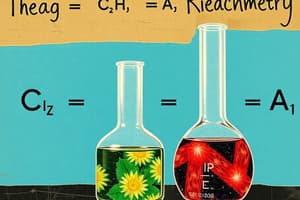Podcast
Questions and Answers
What fundamental principles do chemical reactions abide by?
What fundamental principles do chemical reactions abide by?
- Pythagorean Theorem
- Newton's Laws
- Einstein's Theory of Relativity
- Avogadro's Law (correct)
What is the main purpose of stoichiometric coefficients in a chemical equation?
What is the main purpose of stoichiometric coefficients in a chemical equation?
- To balance the equation by ensuring the conservation of mass (correct)
- To show the color change in the reaction
- To determine the speed of the reaction
- To indicate the temperature at which the reaction occurs
Which type of reaction pairs acids and bases leading to salt formation?
Which type of reaction pairs acids and bases leading to salt formation?
- Synthetic reaction
- Decomposition reaction
- Reduction reaction
- Neutralization reaction (correct)
In a synthetic reaction, what is the outcome?
In a synthetic reaction, what is the outcome?
What does reduction do in terms of oxidation number?
What does reduction do in terms of oxidation number?
Why is balancing chemical equations important?
Why is balancing chemical equations important?
What does oxidation do to the oxidation number of a compound?
What does oxidation do to the oxidation number of a compound?
Why is balancing chemical equations important?
Why is balancing chemical equations important?
In the unbalanced equation \( ext{CH}_4 + 2 ext{ O}_2
ightarrow ext{CO}_2 + 2 ext{ H}_2 ext{O} \), what is unequal initially?
In the unbalanced equation \( ext{CH}_4 + 2 ext{ O}_2 ightarrow ext{CO}_2 + 2 ext{ H}_2 ext{O} \), what is unequal initially?
What is the purpose of adding coefficients in a chemical equation?
What is the purpose of adding coefficients in a chemical equation?
Why do scientists use balanced equations in synthetic reactions?
Why do scientists use balanced equations in synthetic reactions?
What role do balanced chemical equations play in producing specific chemicals efficiently?
What role do balanced chemical equations play in producing specific chemicals efficiently?
Flashcards are hidden until you start studying
Study Notes
Understanding Chemical Reactions and Their Representation through Equations
A chemical reaction involves the transformation of substances, called reactants, into new substances, referred to as products. In these events, chemical bonds within the reactants are broken, while new bonds form among the atoms of the products. Chemical reactions are integral parts of daily life, technological advancements, and natural phenomena, and they abide by fundamental principles established around 250 years ago.
To communicate the participants and amounts of substances during a chemical reaction, we utilize chemical equations. These expressions follow a standard format, denoting reactants with a list of chemical formulas preceded by a plus sign (+), an arrow pointing towards the products, and their corresponding chemical formulas separated by another plus sign. The stoichiometric coefficients before each formula allow calculating the exact proportions of reactants and products according to Avogadro's Law and the conservation of mass.
Diverse Kinds of Chemical Reactions
Based on Change in State of Matter
- Synthetic reactions generate new substances from existing ones.
- Decomposition breaks larger molecules into smaller components.
- Neutralization pairs acids and bases leading to salt formation (an exception to creating entirely new substances).
Based on Changes in Oxidation Number
- Reduction decreases the oxidation number of an element.
- Oxidation increases its oxidation number.
There are numerous additional classifications based on reaction mechanisms, energetics, and environmental conditions.
Writing and Balancing Chemical Equations
Balanced chemical equations ensure equivalency in the number of atoms of each element on both sides, respecting the law of conservation of mass:
| Unbalanced | Balanced |
|---|---|
| (\mathrm{CH}_4 + 2\mathrm{~O}_2 \rightarrow \mathrm{CO}_2 + 2\mathrm{~H}_2\mathrm{O}) | (\mathrm{CH}_4 + 2\mathrm{~O}_2 \rightarrow \mathrm{CO}_2 + 2\mathrm{~H}_2\mathrm{O}) |
In this particular unbalanced equation, the number of hydrogen and oxygen atoms is unequal on both sides; thus, adding coefficients equalizes them:
[ \mathrm{CH}{4(g)} + 2\mathrm{O}{2(g)} \rightarrow \mathrm{CO}{2(g)} + 2\mathrm{H}{2}\mathrm{O}_{(l)} ]
When performing synthetic reactions, scientists employ these balanced equations to predict the outcomes of their work and construct recipes for producing specific desirable chemicals efficiently.
Studying That Suits You
Use AI to generate personalized quizzes and flashcards to suit your learning preferences.




